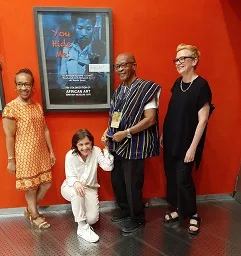The 16-minute film was shown as part of the Archival Assembly #2 Festival held from June 8 to June 15 in Berlin.
Shot in 1970, the film resonated so well with the audience that the event’s organisers knew they had struck a good note with their aim of aligning cinematic heritage as an important element in the future of films.
‘You Hide Me’ shows loads of rare Ashanti and other priceless African artworks stolen by the British in the nineteenth century and stashed away in secret, underground vaults in the British Museum. According to the filmmaker, he had to summon a great deal of guile and boldness to secure access to the well-guarded archives.

Nii Kwate was invited to present his film and be available for a public conversation on it at the festival by Prof Benedicte Savoy of the Technical University of Berlin, an authority on the pillage of art treasures by colonizers. Her book, ‘Africa’s Struggle for its Art – History of a Postcolonial Defeat,’ contains a chapter dedicated to ‘You Hide Me.’
“There’s been an intense global interest in the film over the last few years, part of which resulted in it winning the Best Short Documentary Prize at the 2020 Paris International Film Festival in France,” says Nii Kwate who has over 50 years of experience in the film production arena.
“As happened in Berlin, ‘You Hide Me’ has attracted lots of new, enthusiastic viewers in places like the United States, Brazil, Cuba, Mozambique and South Africa. They all realise the film was a far-seeing product as it was made long before the campaign for former colonial powers to return stolen African arts became a popular call.”
The Asantehene, Otumfuo Osei Tutu II, is reported to have initiated negotiations with British government officials for the possible return of Ashanti royalty emblems seized from Kumasi by the British army after the Ashanti-British war, usually referred to as the Battle of Amoaful, in 1874.
French President, Emmanuel Macron, is also on record to have argued it was unacceptable that a large chunk of Africa’s artistic heritage was outside of the continent and that French law should be changed to make restitution possible.

During the discussion of ‘You Hide Me’ after the Berlin screening, Nii Kwate said the subject matter of the film is of crucial importance to Africans everywhere. He has therefore commenced moves to have it translated into key African languages like Twi, Ga, Ewe, Dagbani, Hausa, Swahili, Zulu, Yoruba, Xhosa, Shona and Amharic.
Dr Clemetine Deliss, a former Director of the Frankfurt Museum in Germany was at the screening and discussion of the film and said afterwards that she was impressed with the programme.
“You were and are brilliant,” Dr Deliss stated in a message to the filmmaker. “It was a wonderful moment and you spoke so eloquently, with humour and precision. I am sure it will lead to paths of happiness for you.”
It’s been a source of happiness to Nii Kwate for over 50 years that in a few minutes, he was able to wrap up centuries of Western cultural pillage in the documentary. It was an eloquent call to action which still gladdens his heart as many more people now appreciate the need for the quick restitution of all the invaluable artworks stolen from Africa.
Representatives from the Ghana Embassy in Berlin were on hand to congratulate Nii Kwate at the festival.















































